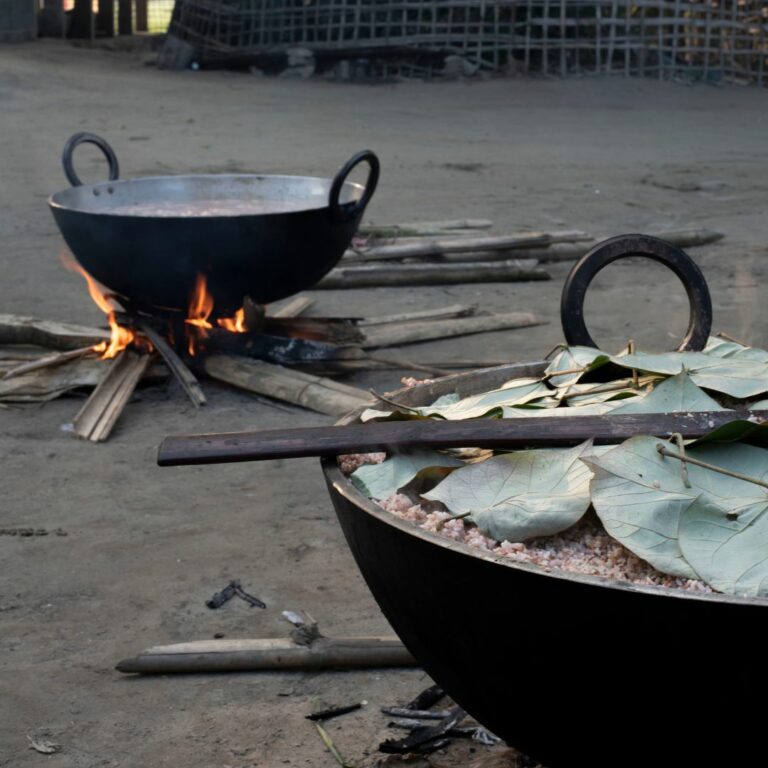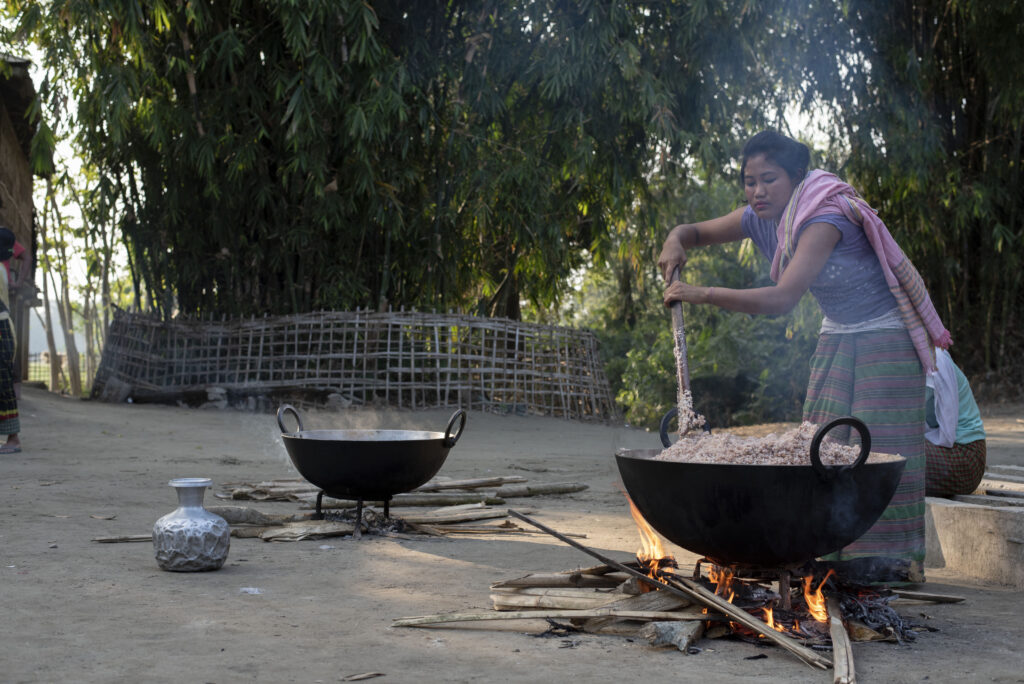NER / HISTORY & CULTURE

The Preparation of Apong by burning rice straws during Ali-Aye-Ligang (Harvest) festival among the Mishings in Majuli, Assam.
PHOTOGRAPH: © ANALI BARUAH
The making and drinking of fermented drinks occupy an important place in the culture and social life of its communities. There is a rich cultural and regional diversity in the fermentation process, taste and nutritional properties of the locally fermented alcoholic drinks. The ingredients and local names vary between ethnic groups and geographical regions. Fermented drinks are usually made from natural products endemic to the region such as rice, millet, barley and other plant parts that contain no chemicals.
As one of the most important staple food in north-eastern cuisine, glutinous rice serves as the base for a majority of locally produced alcoholic drinks. With over 10,000 varieties of indigenous rice grains at one time, one can well imagine the diversity of local cuisine and fermented drinks that emerge from these regions. No two fermented batches are ever the same!
All processes begin with the preparation of the starter – called Amao among the Bodos, wansi among the Garos, bakhor among the Rabhas and countless other ethnic names within the region. The preparation method of the starter is also diverse across communities, each following their traditional recipes and processes that have been passed down by generations – but all make maximum use of indigenous microorganisms that are region and season specific . A number of indigenous communities in Assam such as Bodos, Karbis, Garos and Rabhas mix endemic herbs in their starters that also serve as remedies for ailments. The starter is then mixed with cooked rice and left to ferment for different durations across communities. The final product is called Apong among the Misings and other tribes in the region, Chu among Garos, Jou among the Bodos and Chako among the Rabhas, to name a few.

The Preparation of Apong by burning rice straws during Ali-Aye-Ligang (Harvest) festival among the Mishings in Majuli, Assam.
PHOTOGRAPH: © ANALI BARUAH
Madua is one of the popular fermented millet drinks among different communities in Arunachal Pradesh. Here, finger millets are used as the base material by roasting, cooking and mixing with the existing starter culture. It is covered in ektam leaves in perforated baskets and left to ferment for different durations depending on the season. A sweet aroma is an indication of sufficient fermentation and is usually golden yellow in colour. The processes are slightly different just a few kilometers away- among the Monpas in Tawang. Here, barley may also be added to finger millet with other ingredients also at play such as ash or charcoal to give its distinct smokey flavor.
Research shows that there is no restriction between age, gender or social status when it comes to the consumption of alcoholic beverages. From the young to the elderly, male or female – everybody takes part in the making and drinking of these drinks. Special occasions such as marriages, festivals, birth ceremonies and rites of passages are marked with joyous celebrations from singing and dancing to an overall sense of togetherness over shared drinks and foods. The process of making these beverages are usually taken on by the elderly members of the communities, who instruct the youngsters in following the traditional methods effectively. Women are traditionally more involved in the preparation of these beverages and it is more robustly consumed during events of social value. There is a ritualistic association with its production – special rooms and chambers are maintained for its fermentation and only certain members are permitted in its handling and process. Just as all social practises have a purpose, a contained room with limited access serve to limit the possibilities of the drinks being contaminated.
So come share a cup of local alcoholic beverage with your hosts, freshly made by them in their homes. Learn more about the fermentation processes from your hosts themselves. Every drink shared is a privilege, a new memory filled with laughter and celebration and a taste you shall not forget any time soon!
Check our SET DEPARTURES for related group tours or get in touch with us so our travel experts can create a CUSTOMISED ITINERARY for you!